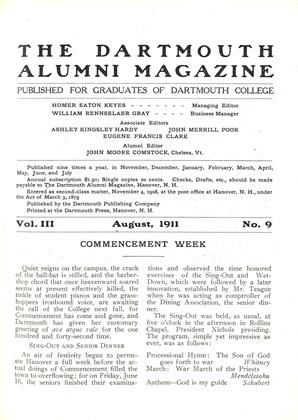Parkhurst Hall, gift to Dartmouth College of Mr. and Mrs. Lewis Parkhurst as a memorial to their son, Wilder Lewis Parkhurst, is now in use as the college administration building. Immediately following Commencement, the task of moving from the old frame building at the north end of the campus be began. Now the transfer is conipleted and the college officers are rejoicing in the change from the old-time cramped, and often uncomfortable, quarters to the cheery and spacious apartments of the new building.
In Parkhurst Hall, Dartmouth College possesses what is probably the finest and most completely equipped college administration building in the country; one of very few devoted exclusively to administrative purposes, and perhaps the only one where all administrative offices are housed together.
The building is of Colonial style, of brick and limestone trim. The construction throughout is fireproof, the floors being of concrete and steel and the roof concrete covered with slate. A short flight of granite steps gives access to the vestibule of the building, where the trustees have erected a bronze tablet bearing the following inscription:
"The trustees of Dartmouth College here record the lasting gratitude of the College to Lewis and Emma Wilder Parkhurst for the gift of this building, erected, equipped, and presented by them as a memorial to their son, Wilder Lewis Parkhurst.
"May the spirit of love and devotion manifested in this gift ever pervade all that is done within these walls."
Within is a huge mosaic-paved'hallway from which open the offices of the Dean, the Registrar, the Superintendent of Buildings, and the Treasurer, the latter place fortified with a bronze grill and furnished with a vast safe hopefully suggestive of future possibilities of college wealth. The woodwork of all these offices is of beautifully toned oak, the walls tinted a restful buff. The rooms are airy and spacious and the atmosphere one of dignified efficiency.
From the hallway a wide marble stairway leads to the second floor. Midway, against a marble ground, is fixed against the wall of the landing a rich yet simple tablet of bronze bearing Mr. and Mrs. Parkhurst's dedicatory inscription. It runs as follows:
To Wilder Lewis Parkhurst
who during a single year of college life realized his high ideals of learning, friendship, duty, and attained the goal of his ambition to be a worthy member of his father's College, may this building stand an enduring memorial offered for the service he might have rendered the College which gave of its best to father and son.
On the second floor are the trustee room and the President's room, finished in mahogany and white enamel; the Secretary's room, the office of the Medical Director, finished, like the offices below, in oak. In the long east wing a great chamber reaching to the gabled roof has been set apart for faculty meetings, The ceiling is of plaster, timbered with oak. The walls are richly panelled in the same wood. At the east end,before a great triple window, is a slight platform where are placed the desk and chair of the presiding officer. Right and left, the length of the room, rise tiers of high backed seats for the members of the faculty in session assembled. Heavy electric lanterns of rich design in brass and tinted glazing hang from the ceiling. The oak panelling and furniture in this room are darker and richer in finish than elsewhere in the building.
Accompanying illustrations showing plans of the first and second floors of the new building will show the convenient and ample treatment of the various offices and committee rooms. Subsequent issues of THE MAGAZINE will publish pictures of some of these rooms. It will be seen, at a glance, that in addition to the public reception rooms there are provided in every case, private offices so located as to ensure the continuously sought, and hitherto frequently interrupted officials against unnecessary intrusion. Every present need has been provided for, and every future demand foreseen by Mr. Parkhurst, whose tireless interest in the erection of the building brought him often to Hanover while work was in progress, and whose large executive powers accomplished the finishing of Dartmouth's most beautiful and soundly constructed hall in a remarkably brief period of time.
From the vast cellar with its fireproof storerooms and iron bound record safes to the large workrooms in the attic, Parkhurst Hall is as complete and perfect as human ingenuity could well devise. It will serve not only to facilitate and harmonize the work of the administrative offices of the College but to give the men concerned an increased and befitting background of dignity and power. Mr. and Mrs. Parkhurst have built not only wisely but extremely well; the monument which stands to their honor and to the memory of their son will long endure in usefulness and in beauty.
 View Full Issue
View Full Issue
More From This Issue
-
 Article
ArticleCOMMENCEMENT WEEK
August 1911 -
 Article
ArticleTHE STATE OF DARTMOUTH COLLEGE
August 1911 -
 Article
ArticleTHE AMOS TUCK SCHOOL OF ADMINISTRATION AND FINANCE
August 1911 By William R. Gray -
 Article
ArticleATHLETICS AT DARTMOUTH
August 1911 By George A. Graves -
 Article
ArticleThe Death of Professor Wells
August 1911 -
 Article
ArticleTHAYER SCHOOL OF CIVIL ENGINEERING
August 1911 By Robert Fletcher










